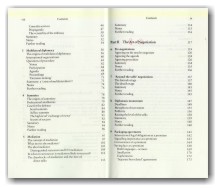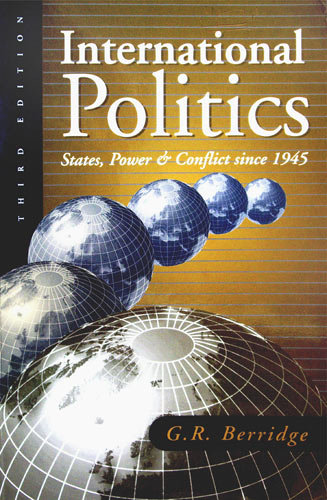International Politics: States, Power and Conflict since 1945
(Prentice Hall/Harvester Wheatsheaf: Hemel Hempstead, 1997, 3rd edition)
This book is now very dated, of course, but (at the time of writing, October 2023) I think that the structure has held up well enough. It has 244 pages in total, including full author-supplied index, further reading at the end of each chapter, and 57 illustrations (tables, boxes, figures and maps).
It is designed to support a general undergraduate course on International Relations, and is based on the second year course which I taught at the University of Leicester in the late 1970s and 1980s. The book was first published in 1987 and was brought out in a second, fully revised edition in 1992. The third edition was published by Prentice-Hall/Harvester Wheatsheaf in paperback in 1997 and is now available in e-book form under the Routledge imprint and with a differet cover here.

Preface
Part A States and their setting
- Great powers and lesser states
- The world economy
- States and multinational corporations
- States and conflict
Part B The instruments of conflict
- Secret intelligence
- Force
- Economic statecraft
- Propaganda
Part C The states-system
- The ‘constitution’ of world politics
- The balance of power
- Diplomacy
- Peacekeeping
- The UN welfare network
Conclusion
Appendix: Notes on reference books
Index
Reviews
- ‘A splendid introductory survey of issues which are central for an understanding of international relations. The writing is clear and crisp.The book has two great merits. Firstly, it does not get tangled up with abstruse issues of a theoretical or conceptual kind. And secondly, it has a very sharp focus … There is nothing here to confuse or dismay the beginning student. Berridge offers plain straightforward fare at its nourishing best. I will be recommending his book to my students with great enthusiasm’,Alan James, University of Keele (from the jacket).
- ‘Here at last is a compact text, written in a lucid style by a scholar who has thoroughly digested the mass of modern literature in the complex field of International Relations. Anyone seeking a critical and analytical introduction to the major structures and issues of the contemporary international scene will find this work invaluable’,Derek Heater, formerly Brighton Polytechnic (from the jacket).
- ‘This refreshing introductory textbook … bears the hallmark of uncompromising realism – the work of a versatile neo-classicist, somewhat out of the mainstream. Most of the issues that are central for an understanding of international relations are crisply examined. … Berridge draws – with originality – on the work of other scholars, notably Bull, Carr, Hoffman, Waltz and Wight. A textbook of considerable stylistic mastery, it will no doubt be widely valued for general introductory courses on International Relations at undergraduate level’,André du Pisani, SA Institute of International Affairs (International Affairs Bulletin).
- ‘introduces the reader to a framework for the understanding of international politics in their totality, and to the vocabulary and concepts of academic analysis in a gentle, straightforward fashion … Where so many “introductory texts” assume too much – particularly in terms of understanding a specialised vocabulary – this one grasps the nettle of definition of terms with a confidence that must instill confidence in turn in the reader. In its discussion of illustrative examples in terms of vocabulary and concepts it provides an illuminating extension of the basic task of a textbook. … easy to use and a most effective source of inspiration and guidance for further study.For undergraduate students the value of this textbook is abundantly clear… It can be enthusiastically recommended for mature students in adult or further education… For anyone generally interested in contemporary international politics, even if neither teacher nor taught, the final recommendation can be, quite simply, that this book is a very good read’,Derek Smith, University of Bristol (Teaching Politics).



